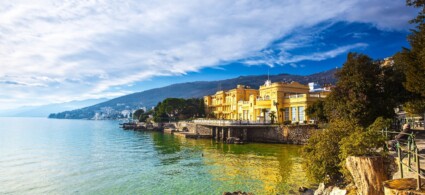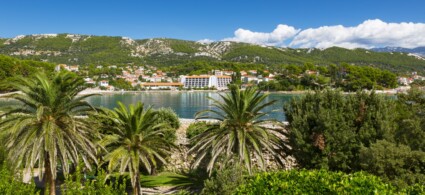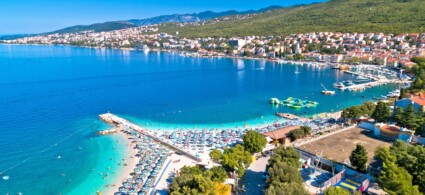

Unfair fate that of the Kvarner, a region of great tourist influx, rich in scenic and cultural beauty, whose name is little known.
Due to its location, it is often confused with Istria or Dalmatia, but if you name two of its most famous locations, the historic towns of Rijeka and Opatija, everyone will tell you where they are.
Tourism is undoubtedly the main activity in the region, with a tradition of welcoming tourists that dates back as far as the 19th century. The grandiose palaces of the past are one of the wonders of the region, although it is generally the natural attractions that attract visitors here.
Crystal-clear waters where dolphins swim, wilderness areas where griffon vultures fly, enchanting beaches and some of the most beautiful islands in Croatia are the wonders that await you in Kvarner.
Kvarner is also an excellent choice for those who follow the new trend of active holidays. If you get bored of lying in the sun doing nothing, you can keep fit with unforgettable dives in the clear waters of the area or picturesque treks in the mountains near the main towns.
During your holiday in Kvarner you can indulge in the pleasures of the cuisine: the local gastronomic tradition boasts tasty local dishes that are a must try.
But if it is not Istria and not Dalmatia, where exactly is Kvarner? Well, you could say between one and the other…. It is a region in northern Croatia named after the arm of the sea between southern Istria in the north and the island of Cres in the south.
Rijeka, the main city of the region and the third largest city in Croatia, is 160 km from Zagreb, the capital of the country.

Often visited only as a place of passage, Rijeka is a historical city with a pretty centre that deserves a longer stop.
Nestled between sea and mountains, Rijeka offers numerous attractions, including sumptuous palaces reminiscent of the splendour of the Habsburg Empire, medieval fortresses and bridges, and elegant shopping streets.

Many tourists think it is an Istrian town, in reality Opatija is located on the north-western edge of the Kvarner Gulf.
It is certainly one of Croatia’s most famous tourist resorts: the tourist industry developed here as early as the 19th century, when Opatija became a holiday destination for kings, emperors and wealthy celebrities. The magnificent villas of the wealthy holidaymakers of the past are the pride of the town, but you no longer have to spend a fortune to stay in Opatija.
Like the tsars, artists and wealthy people of the past, you too can stroll under the shade of laurel and holm oaks on its enchanting 12 km-long promenade, dive into the crystal-clear waters of the beautiful beaches nearby and explore the trails of the Učka mountain, which has been declared a nature park.
What you can do more than the rich in the 19th century is learn about the history of tourism in the Kvarner region by visiting the original Croatian Tourism Museum or take pictures of the statues scattered around the town, romantic, bizarre and nostalgic.

Connected to the mainland by a bridge, the island of Krk is easily accessible by car and this convenience, combined with a good choice of accommodation from budget to luxury and numerous tourist services, has made it one of the most popular islands in Croatia.
It is the largest of the Croatian islands and has an impressive number of mostly pebble beaches, some of which have been awarded Blue Flag status.

Rab is considered by many to be the most beautiful island in the Kvarner Bay and is an ideal destination for nature lovers who want to stay away from the more mundane tourist resorts. This natural paradise, declared a Geopark in 2008, has a varied landscape that alternates between pine forests and gentle stretches of olive groves and vineyards.
The south coast is the most populated area, where the villages are concentrated, while along the rocky north coast the landscape is more rugged.

If you love nature and wild landscapes, visit the sparsely populated island of Cres, which has a mysterious charm. With a bit of luck, if you look up you might spot one of the few remaining griffon vultures, Croatia’s iconic bird, now endangered.
The island’s long, indented coastline with its many bays, small beaches and hidden coves is the island’s great attraction, but the hinterland is also worth exploring, with its ancient villages where time seems to stand still.
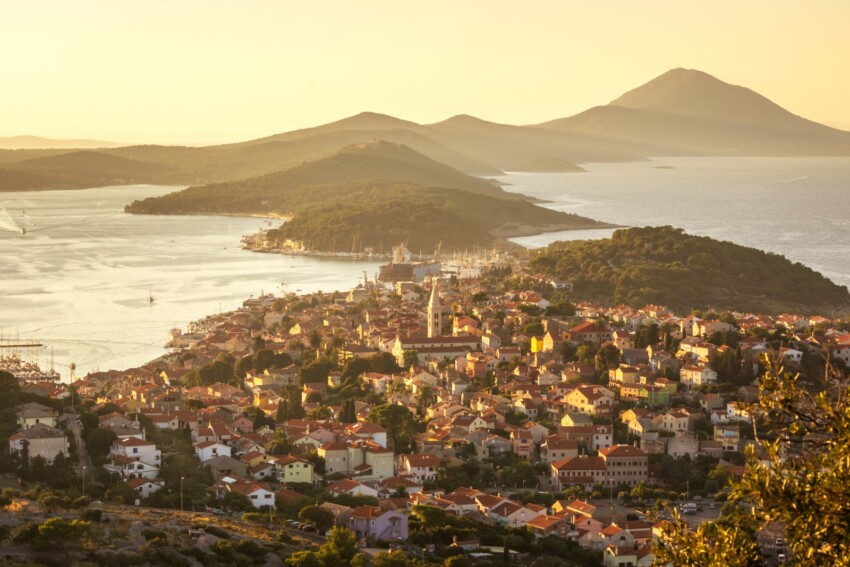
From Cres, you can drive to the small island of Losinj, with its characteristic settlements of Mali Lošinj and Veli Lošinj and beautiful bays and coves bathed by azure blue sea, where it is not uncommon to see dolphins swimming.
During your holiday on Lošinj, let yourself be inebriated by the scents of nature. Hundreds of different plant species grow on the island and Lošinj has become famous for the cultivation of herbs and the production of natural cosmetics.

Another wonderful area of Kvarner is the Ucka National Park, 160 square metres of beech, chestnut, oak and hornbeam forests.
This is a true paradise for nature lovers and for those travelling with children and young people. It is possible to spot golden eagles, owls and peregrine falcons soaring through the sky, sheep grazing in the lush green meadows and plenty of wild flowers.
Don’t miss the spectacular canyon of Vela Draga, a valley floor dotted with peculiar limestone formations known as ‘fairy chimneys’, with a 15-minute walk along a path with panoramic viewpoints. Mala Ucka, on the other hand, is an old, semi-abandoned village still inhabited by very few shepherds where you can taste or buy delicious sheep’s cheese.

This magnificent park, which covers an area of 63 square metres, is an immense area covered with beech and pine forests, flower-covered meadows and dotted with cracks, caves and chasms. Little known to mass tourism, Risnjak National Park is a great alternative to beach life for those who enjoy walking and trekking and want to escape the heat and sultriness of the coast.
To explore the park, we recommend you follow the Leska Trail, a delightful, shady 4.5-kilometre route that winds through fir forests, past cool streams and rock formations.
The trail is easily accessible to all, is well signposted and has signs illustrating the flora and fauna of the park as well as its history, geology and topology.
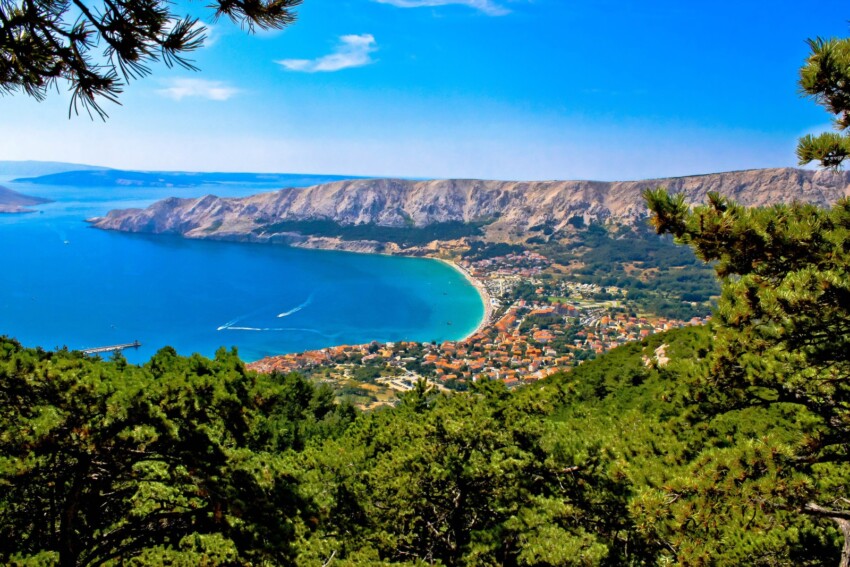
The Kvarner region lies on a wide gulf and can therefore boast a long coastline with calm, protected waters. Adding the bays, beaches, coves and inlets of mainland Croatia to those of the islands, you get an impressive number of idyllic places where you can spend lazy and relaxing days or, if you prefer, active holidays of swimming, diving and other water and non-water sports.
Here are five unmissable beaches in the Kvarner region:
Being a tourism-oriented region, Kvarner offers a wide choice of accommodation and hotel facilities, suitable for different types of travellers, from luxury to budget hotels and hostels. Room rentals and campsites are also common.
Both budget and medium-high category hotels are all concentrated along the coast and on the islands, where the influx of tourists is greatest.
The tourist resorts in Kvarner are all easily accessible by car . It is also possible to reach Kvarner by sea, taking a boat from Venice. The main tourist resorts in Kvarner are connected by bus to other major Croatian cities.

